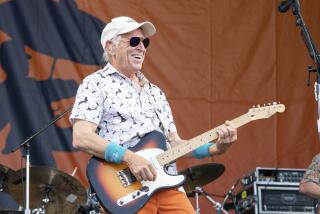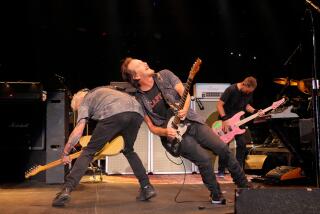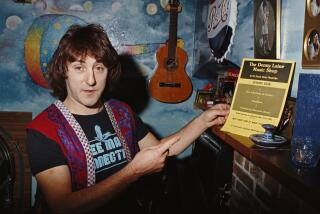McCartney Masters the Possibilities, Inks Deal With Visa
- Share via
Paul McCartney--acknowledged as one of rock’s richest stars--is getting richer. It was announced Monday that Visa will sponsor the ex-Beatle’s 1990 U.S. concert dates.
At a Forum press conference to announce an 11-city U.S. concert swing and acknowledge the possibility of a Beatles reunion, McCartney also found himself defending his just-signed Visa sponsorship deal.
“I don’t see it as a sellout and anyone who does ought to go live in Russia,” McCartney said. “This is a capitalist country.” He added that he would not actually be pushing product: “As far as I’m concerned, it’s them promoting us.”
The reported $8.5-million advertising campaign will feature McCartney and tout the fact that his concerts “don’t take American Express”--Visa will be the only credit card accepted for purchase of McCartney concert tickets. McCartney’s 1990 tour will start in Detroit on Feb. 1, with additional cities to be announced.
Before the press conference, the rock star was forming a portion of a Visa television spot outside the Forum.
The first-ever appearances of McCartney in advertising follows such noted corporate-rock hook-ups as Michael Jackson and Pepsi, and sponsorships of the Who’s summer tour by Miller beer and the current Rolling Stones trek by Budweiser.
The subject of rock and sponsorship has long been controversial, both for the general concern about the commercialization of what was once perceived as a counter-culture phenomenon and for such specific brouhahas as Pepsi’s tie-in earlier this year with Madonna’s “Like a Prayer,” for which the singer produced a video which some called blasphemous.
McCartney himself was critical that Michael Jackson, who had purchased the Beatles song catalogue, allowed the song “Revolution” to be used in 1987 television ads for Nike. The Beatles sued for $15 million, fans wrote the shoe company vituperative letters and Nike abandoned the campaign.
But McCartney was in turn chastised by members of the rock community for selling songs from the Buddy Holly catalogue, which he owns, for commercials (one turned “Oh Boy!” into “Oh Buick!”).
Already there has been negative reaction to the announcement from rock observers and Beatles fans.
“My personal preference would be that they don’t have sponsors, especially someone like McCartney, for whom money is not a problem,” said Jim Henke, managing editor of Rolling Stone magazine, acknowledging that he finds it less offensive than if someone with the image of a Bruce Springsteen had agreed to sponsorship. “But he’s an ex-Beatle and has that tradition and body of work to uphold.”
McCartney is not the first Beatle to take the commercial route, however. Ringo Starr has pitched wine coolers and stars in one of the “This Is Not Your Father’s Oldsmobile” commercials.
The tour is McCartney’s first since the 1976 “Wings Over America” series. Where those featured a few songs from the Beatles era, the current shows are dominated by them, with selections drawing on the innocence of the early Beatles and the turmoil and upheaval of the later ‘60s.
As for McCartney’s own one-time revolutionary image (as recently as January, 1980, he spent nine days in a Tokyo jail for possession of marijuana), a Visa spokesman dropped the subject like a bad credit risk.
“We think that he’s a perfect association,” said Dave Brancoli, director of public relations for San Francisco-based Visa USA. “He does have a very family-oriented image that fits in nicely with the demographics of our card owners.”
More to Read
The biggest entertainment stories
Get our big stories about Hollywood, film, television, music, arts, culture and more right in your inbox as soon as they publish.
You may occasionally receive promotional content from the Los Angeles Times.









